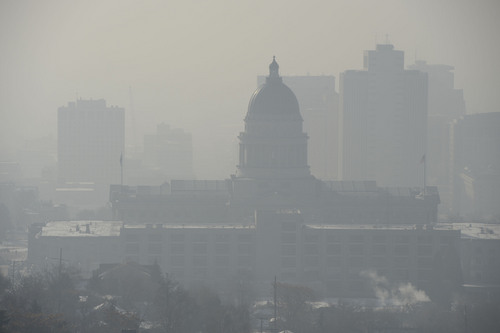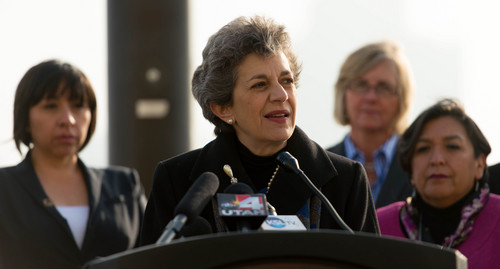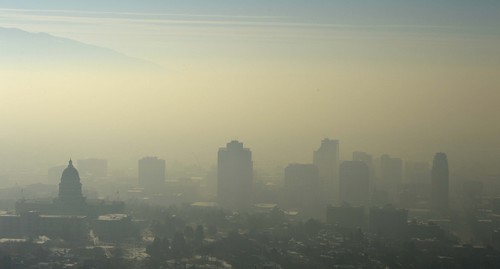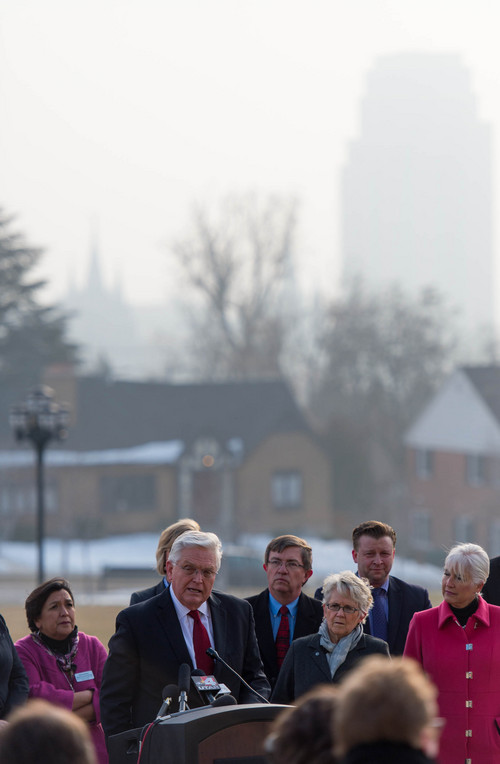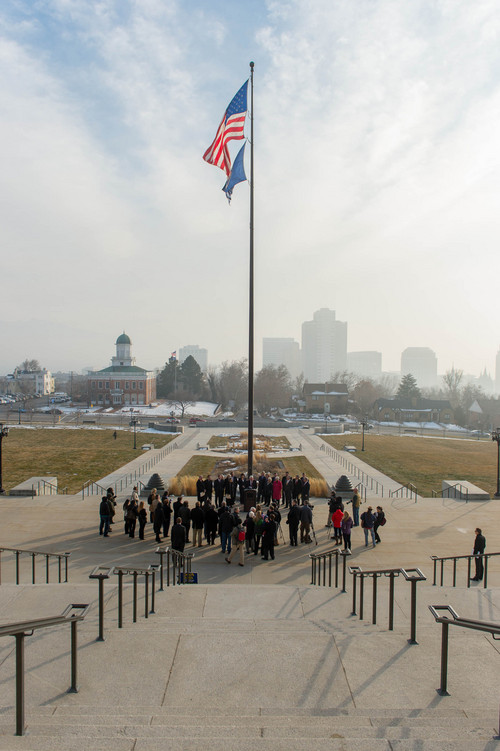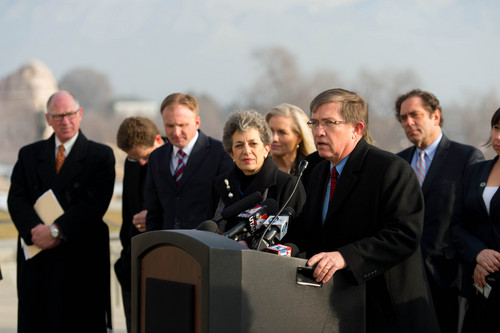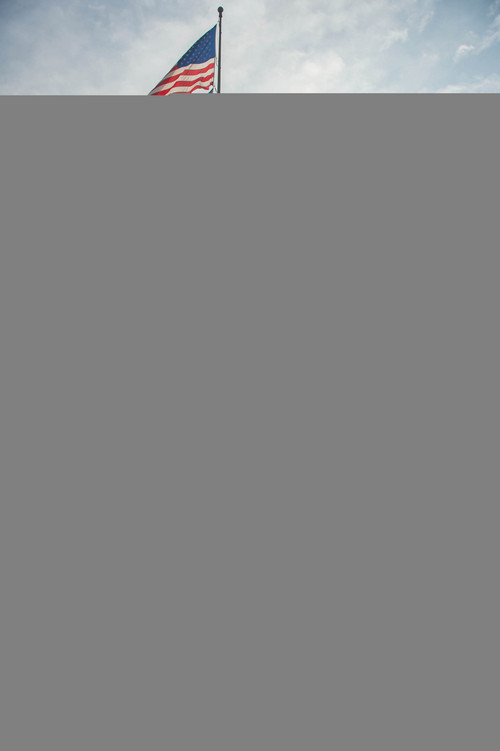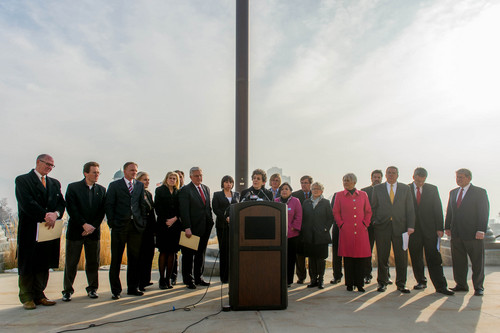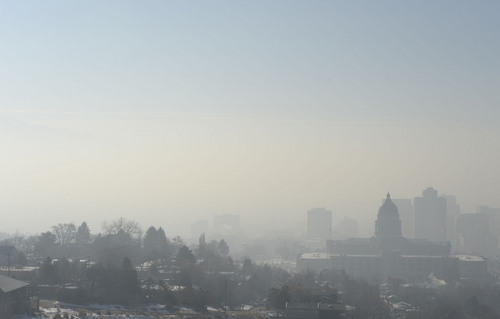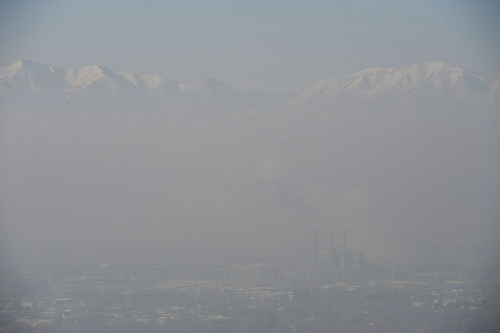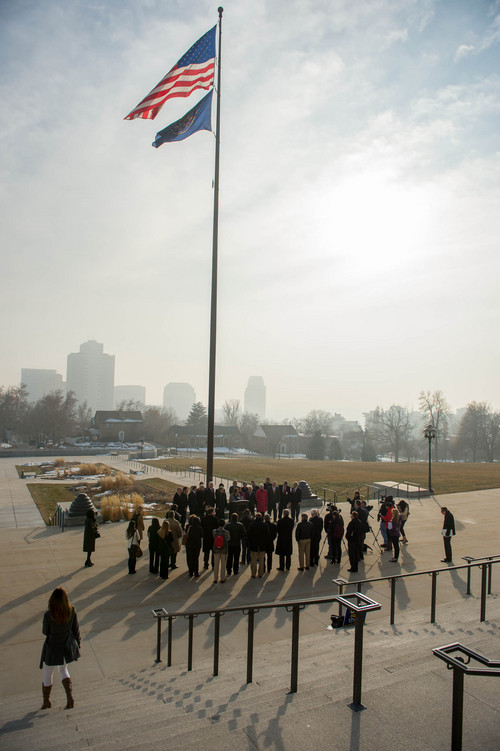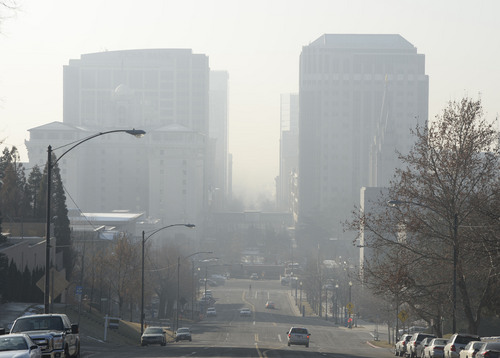This is an archived article that was published on sltrib.com in 2014, and information in the article may be outdated. It is provided only for personal research purposes and may not be reprinted.
A bipartisan group of Utah lawmakers intends to shine a spotlight through the state's dirty air during the upcoming legislative session in the hopes of spurring "meaningful action to improve the air we breathe."
The House Clean Air Caucus on Wednesday unveiled 15 bills on the Capitol steps, overlooking the smog-choked Salt Lake Valley where particulate pollution climbed to levels more than double the federal standard of 35.5 micrograms per cubic meter of air.
All geared to reducing emissions, the measures seek to make it easier and less expensive to drive clean vehicles, replace or retrofit "dirty diesel" school buses, encourage people to ride buses and TRAX and expand the authority of the Utah Department of Environmental Quality.
"None of us want our air to look like it does today," said caucus co-chair Patrice Arent, D-Millcreek.
"Our Clean Air Caucus members are concerned that the poor air quality we experience during winter inversions and other times of the year is seriously damaging both our personal health and Utah's economy," Arent said, flanked by 19 legislators hailing from both ends of the state and political spectrum. "It takes some of the joy out of living in our beautiful state."
Wednesday's foul skies were made to order for such an announcement and helped illustrate the need for bigger cuts in emissions. With an air quality index of 156, Salt Lake City was vying with Bakersfield and Visalia in southern California for the nation's dirtiest air. Provo and Logan were also among the five cities with the poorest air quality.
Despite air quality gains over the past decade, a new poll shows Utahns are growing increasingly concerned about pollution. More than two-thirds want tougher emissions standards imposed on industry, even though state officials say such sources account for only 11 percent of the state's air pollution.
Arent unveiled measures such as loosening utility regulations to remove a bureaucratic roadblock to electric-vehicle charging stations and HB38, which would create the position of sustainability director to serve in the Governor's Office of Management and Budget.
Another bill, sponsored by Rebecca Edwards, R-North Salt Lake, would repeal old statutory language that bars the state Department of Environmental Quality from adopting standards and regulations more stringent than those of the U.S. Environmental Protection Agency.
Edwards and co-sponsor Joel Briscoe, D-Salt Lake City, contend that Utah regulators should be allowed to craft rules that are tailored to Utah.
"We don't have that ability and our hands our tied," Edwards said. "Removing that prohibition would free them to make better decisions, more complete decisions."
Edwards, along with Republican Sen. Todd Weiler, also intends to push legislation to ban the incineration of medical waste "within close proximity" of schools and homes. Their Davis County districts host the controversial incinerator operated by medical waste handler Stericycle, whose 22-year-old facility now abuts the newer Foxboro neighborhood.
Briscoe, a caucus co-chair, also proposes allowing Wasatch Front counties, with voter approval, to raise the portion of the sales tax devoted to public transit to a full 1 percent. He noted that the Utah Transit Authority has greatly expanded light rail and commuter lines, but perhaps at a cost of reduced ridership overall.
"It's great if you live on those lines, but we cut back bus service," Briscoe said. "Buses aren't sexy, but they are the bread and butter of the transit system."
He acknowledged raising taxes is a tough sell, but he noted there are proposals to raise the gasoline tax to fund highway construction and argued transit needs to be part of that conversation.
"If we make our cars twice as clean and double the number of cars on the road, we are right back where we started," Briscoe said.
Another Arent-sponsored bill, HB61, would set aside $200,000 for expanding the Clean Fuels and Vehicle Technology Grant and Loan Program to include electric hybrid cars. This program provides financial assistance for the purchase of new clean-fuel vehicles, conversion or retrofit of existing vehicles, and developing fueling infrastructure.
HB41, sponsored by Stephen Handy, R-Layton, would allocate $20 million for matching funds to replace 170 school buses manufactured before 2002 and to build alternative fueling stations.
The sustainability official envisioned in Arent's HB38 would be appointed by the governor and charged with helping state agencies craft and implement measures that save energy and cut emissions.
Tracking bills
Some of the 15 bills proposed by the House Clean Air Caucus are still being drafted. Track the numbered bills and watch for others at http://le.utah.gov/Documents/bills.htm. —
Town hall on Utah air quality on Jan. 29
The Salt Lake Tribune's Jennifer Napier-Pearce will moderate a town-hall discussion on Utah's air-quality challenges with a panel of experts at 7 p.m. Jan. 29 at the Salt Lake City Main Library, 210 E. 400 South.
The discussion will be broadcast live on KCPW 88.3/105.3 FM and at sltrib.com. You can submit questions in advance by sending an email to utairquality@sltrib.com. —
Share your bad air day
How does poor air quality affect you? The Salt Lake Tribune and KUED Channel 7 want to hear your bad-air-day stories — whether written or video-recorded.
Send stories to utairquality@sltrib.com or outreach@kued.org with "My Bad Air Day" in the subject line, or share them at facebook.com/saltlaketribune or facebook.com/kuedchannel7.
You also may share video stories on Tout at tout.com/sltrib or at #mybadairday on Instagram. The Tribune and KUED will share your stories as part of our ongoing air-quality coverage.


